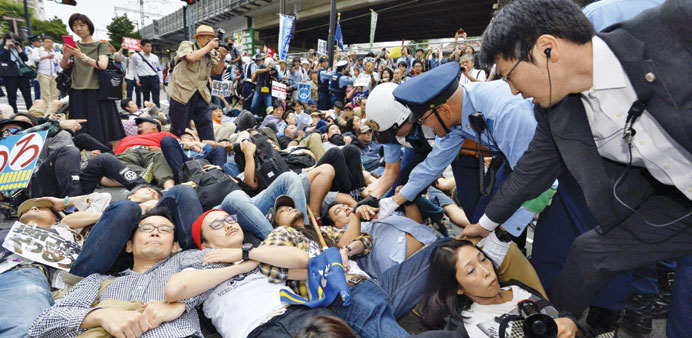AFP/Tokyo
Thousands took to Japan’s streets yesterday to protest at laws expected to be passed this week that could see troops fight overseas for the first time in 70 years, despite mass public opposition.
An estimated 13,000 people gathered under drizzle outside parliament in Tokyo demanding the bills be scrapped, ahead of a scheduled committee vote — the penultimate stage before the bills become law in the officially pacifist nation.
By almost 10pm (1300 GMT) the debate had still not started as prime minister Shinzo Abe tried to consolidate cross-party support for the controversial legislation.
“Japan is now heading towards war, blindly following the United States. The bills are against the constitution,” said 55-year-old Makiko Inui as she stood in the rain outside parliament.
“Prime minister Abe is wrong in his way of trying to build peace. We must oust Abe or Japan could be destroyed.”
Yesterday’s protests were the latest in weeks of rallies that have drawn tens of thousands onto the streets to oppose Abe’s plans to expand the role of the military, a show of public anger on a scale rarely seen in Japan.
Organisers said 35,000 people had turned out for the rally, although police said 13,000 had gathered.
Earlier in the day hundreds of people faced off from a line of police outside a hotel in Yokohama, a city south of Tokyo, where lawmakers were holding a public hearing on the bills.
Demonstrators later began blocking roads, chanting anti-war slogans and trying to stop lawmakers from driving away after the debate.
“I am angry,” said 28-year-old Hironobu Saeki, a graduate student at Ritsumeikan University in Kyoto, outside parliament.
“The Abe government... is taking its people too lightly,” he said.
Under the planned changes the military — known as the Self-Defence Forces — would have the option of going into battle to protect allies such as the United States even if there was no direct threat to Japan itself or its people.
Although the current post-war constitution, which bars troops from taking part in combat except in pure self-defence, was imposed by US occupiers, many Japanese feel strongly any change would alter the country’s pacifist character.
There are growing signs the bills have taken a toll on Abe’s once high popularity. Opinion polls show the vast majority of the public oppose them.
But despite the fierce opposition, the bills are expected to be approved by both the committee and Japan’s upper house, where the ruling coalition has a majority large enough to push them through.
Opposition parties have made every effort to block the bills, including by physically trying to prevent committee members from entering the chamber for yesterday’s debate.
But they were still expected to become law today.
Many legal scholars have said the changes are unconstitutional, and critics worry they would drag Japan into American wars in far-flung parts of the globe.
Abe and his supporters say the bills are necessary to deal with a changing security environment marked by an increasingly assertive China and unpredictable North Korea.
Japan said yesterday it has lodged a protest after uncovering evidence that China has started extracting gas in a disputed area near their border in the East China Sea.
Japan suspects China now has seven drilling rigs in operation out of 16 it has positioned close to its de facto maritime border with Japan, officials said, the latest twist in a row over gasfields in waters claimed by the two countries.
“We are protesting with the Chinese side through a diplomatic channel,” chief cabinet secretary Yoshihide Suga told a news conference.
“It is extremely regrettable that the Chinese side... has unilaterally gone ahead with the development while the border has not yet been settled,” Suga said.
Japan and China agreed in June 2008 jointly to develop the undersea reserves in the disputed area, with a ban on individual drilling.
“China needs to abandon its unique obsolete argument, that no other countries adopt, that no international rulings have admitted -- that its rights extend along the continental shelf” to near Japan’s southern Okinawa islet chain, a senior foreign ministry official told reporters on condition of anonymity.
Tokyo has long suspected that Beijing would violate the joint development agreement for the field, which lies in an area where both countries’ claimed exclusive economic zones (EEZ) overlap.
Japan says the median line between the two nations should mark the limits of their respective EEZs.
But China insists the border should be drawn closer to Japan, taking into account the continental shelf and other features of the ocean.
The rigs are on China’s side of the boundary, whichever measure is used.
China is also embroiled in a separate row with Japan over disputed islands elsewhere in the East China Sea.
The islands are controlled by Tokyo, which calls them the Senkakus, while Beijing claims them as the Diaoyus. Chinese ships and aircraft regularly test Japanese forces in the area.
China also has disputes with several other nations in the South China Sea, which it claims in its entirety.

Protesters lie on the ground as they try to stop a car carrying members of the parliament’s upper house security bills committee in Yokohama, south of
